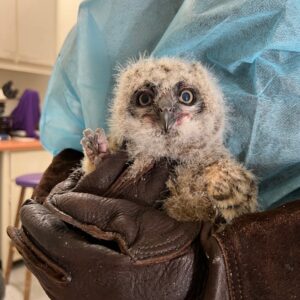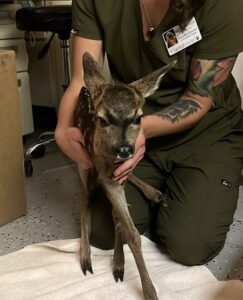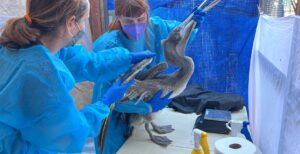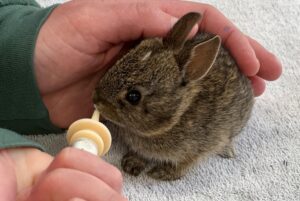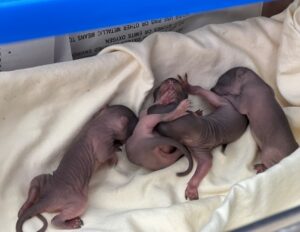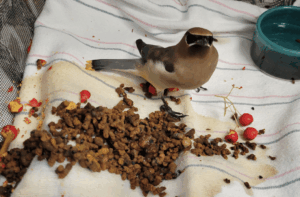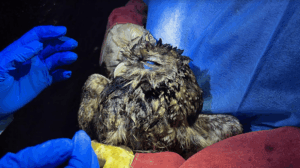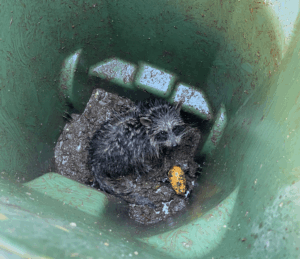Uncategorized
Great Horned Owl Reunite
Thank you for visiting this page! WildCare is attempting to reunite a family of Great Horned Owls. Two owlets fell from their nest in the trees above. At this age, these young owls are considered “branchers”, meaning they are exploring out of the nest and practicing hop-flying on the branches nearby. This is a precarious…
Read MoreFirst Fawn of 2023 — Reunited!
Every spring WildCare admits a number of animals, usually fawns and baby jackrabbits, that have been “kidnapped” by well-meaning people who found them alone and assumed they needed help. In fact, one in five of the fawns brought to WildCare in 2022 were healthy and were promptly returned to their mothers’ care.The family that found…
Read MoreDealing with Avian Influenza in the Wildlife Hospital
Watch our team weigh and test one of 12 newly-admitted Mallard ducklings in the video above! You may be wondering about the Highly Pathogenic Avian Influenza (AKA “Bird Flu” or HPAI) outbreak, whether the virus is still with us, and whether or not you need to be concerned about it. The short answer is: yes.…
Read MoreBaby Great Horned Owl Fallen From Nest
Just as Wildlife Baby Season starts, the recent chain of historically powerful storms in our region has caused an unprecedented number of downed trees – many of them host to nesting sites for wild animals!This fuzzy nestling Great Horned Owl was seen sitting alone on the ground along a bike path in a local park…
Read MoreTiny Baby Brush Rabbit in Care at WildCare
Jackrabbits, despite having the word “rabbit” in their name, are actually hares and give birth to precocial young. This means baby jackrabbits open their eyes and can run and jump almost as soon as they are born. WildCare admits many baby jackrabbits whose rescuers find them “alone” in the grass and assume they are orphaned.…
Read MoreFirst Baby Squirrels of 2023
When the first baby squirrels arrive at WildCare’s Wildlife Hospital in mid-February, we know it’s going to be a busy Baby Season.Usually we admit our first tiny, pink baby squirrels in March, followed a few weeks later by baby animals of dozens of different species. These five little squirrels are only two weeks old (baby…
Read MoreCedar Waxwing Recovers at WildCare
Migratory Songbirds and Windows This Cedar Waxwing was brought to WildCare after being found on the ground. Cedar Waxwings are migratory songbirds that travel in large flocks. Their high-pitched whistling calls and their sheer numbers make them easy to spot, and their preference for the bright orange berries of the pyracantha bush make them common…
Read MoreInternships
Internships at WildCare Wildlife Hospital Internships Wildlife Hospital Internships 2024 Spring/Summer Internships WildCare offers internships in our Wildlife Hospital during the spring and summer months. Interns have the opportunity to work hands-on with our wild patients and gain extensive experience learning from our medical staff.Approximate 2024 Internship TermsInterns will commit to a 3-month or a…
Read MoreRain-Soaked Patients at WildCare
Relentless heavy rain takes its toll on wildlife! If we all feel a little tired of being damp after 11+ days of storms, imagine being outside, wearing only feathers or fur! Of course wild animals have adapted to survive winter storms, but sometimes even the best-prepared need help. Fortunately, WildCare is here to give it!…
Read MoreCompost Raccoon Recovers at WildCare
San Rafael homeowners found this young female raccoon, wet, cold and shivering, in their compost bin after a rainy and stormy night. She must have scented something edible in the bin, and then found herself unable to climb back out!The homeowners immediately called WildCare’s Hotline at 415-456-7283, and our Hotline operator Barbara recognized that this…
Read More
